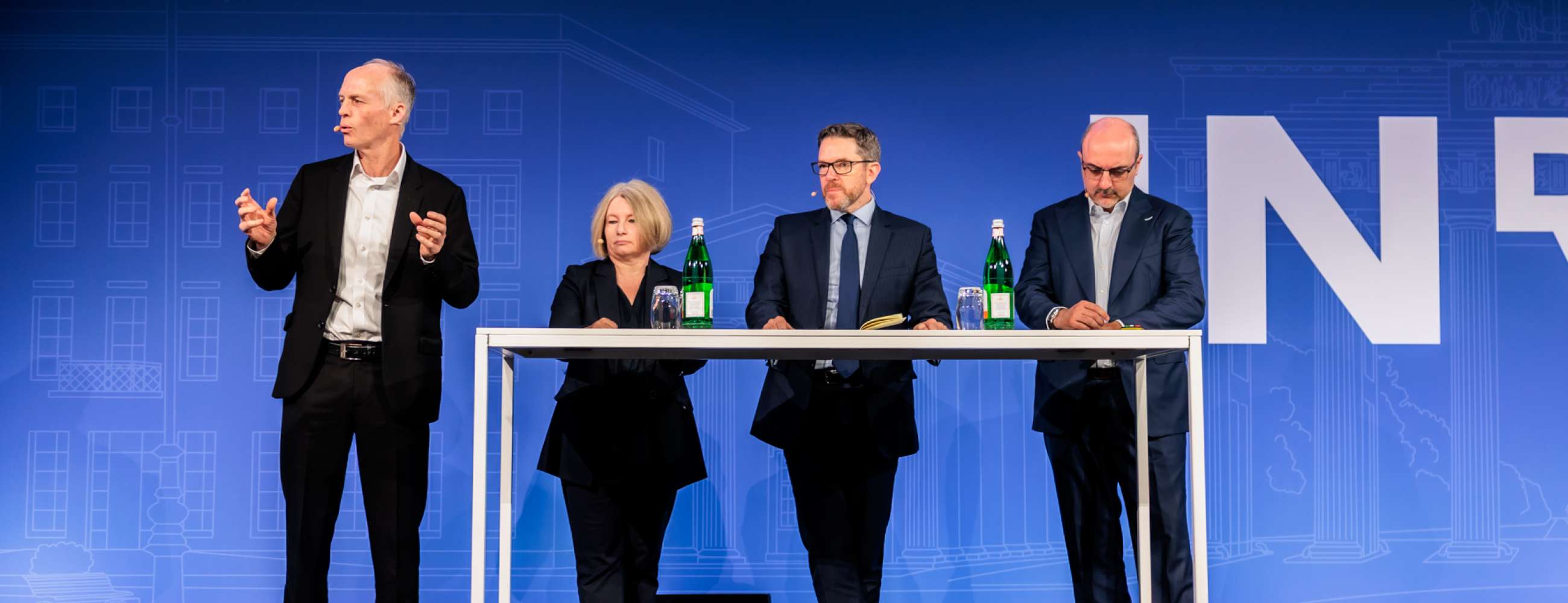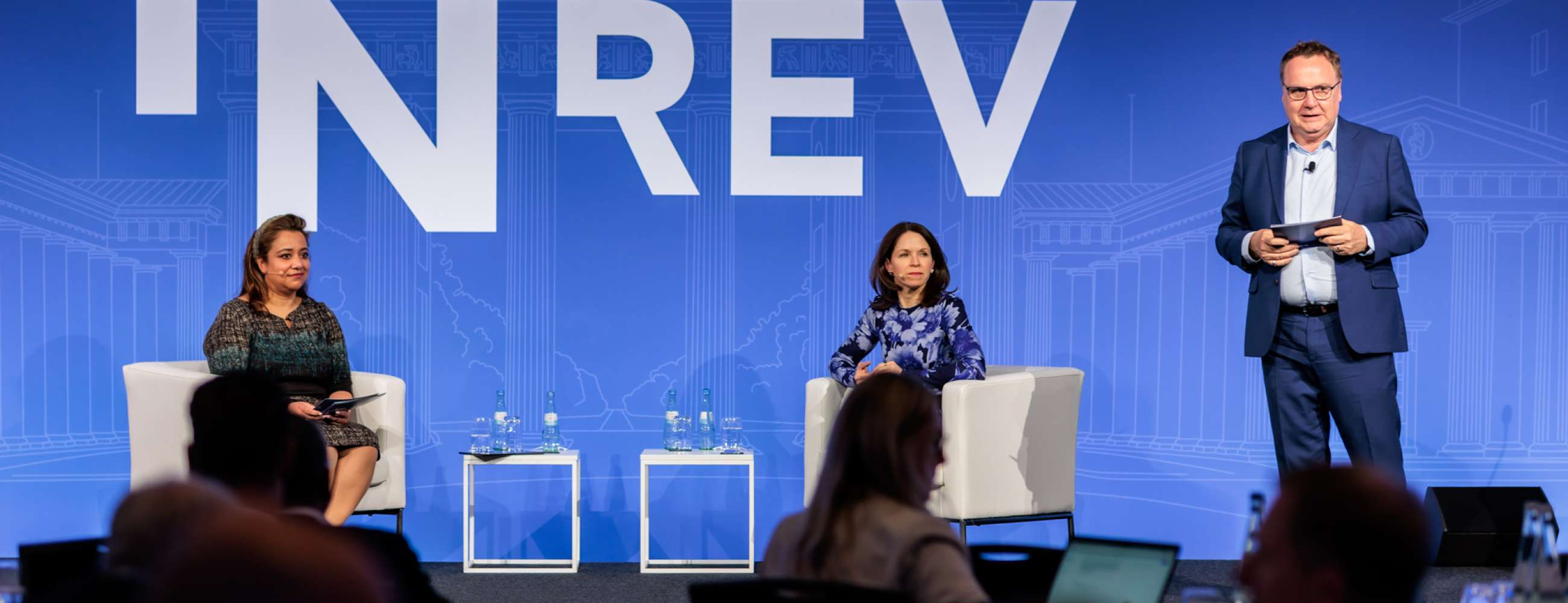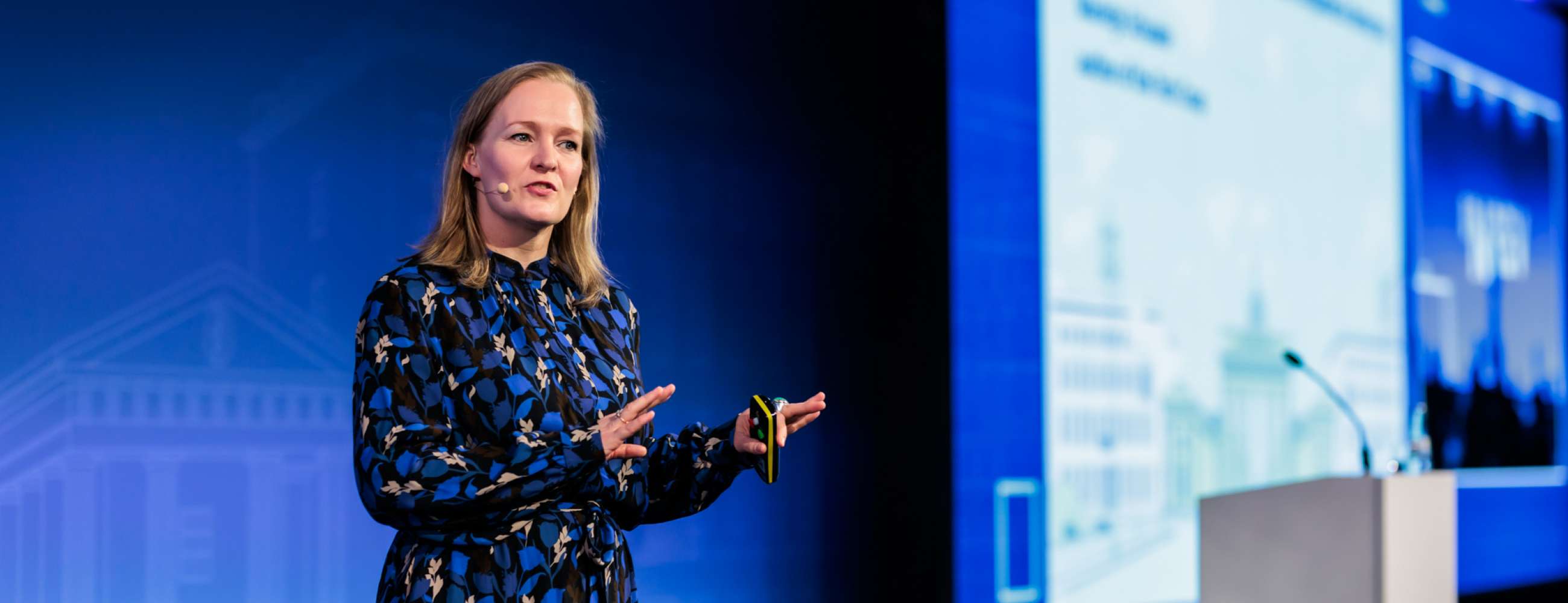INREV Annual Conference 2025 Berlin: A Summary
The INREV Annual Conference 2025 took place in Berlin over 22, 23 and 24 April. We welcomed an enthusiastic crowd of senior industry players to hear the latest trends, insights and thoughtful discussion around a central theme: 'The age of innovation: real estate's path to new realities'.
ANNUAL CONFERENCE 2025 HIGHLIGHTS

Nearly 500 members gathered in Berlin last week for the 2025 Annual Conference. The event brought together a diverse group eager to gain useful insights on hot topics dominating the current environment for business, economics and politics. A quarter of attendees were annual conference first-timers, while 22% were long-time participants with 11 or more conferences under their belt. Investor members made up an impressive 27% of the audience, representing 85 member companies.
The line-up of speakers, from both within and outside the real estate industry, delivered valuable insights and truly impressed. Delegates were treated to a rich mix of well-informed commentators and rigorous debate. Topics ranged from the challenges posed by a likely global trade war and (actual wars in Europe and the Middle East), to the opportunities (and potential threats) presented by the inexorable progress of AI. Attendees also heard enlightening insights from less obvious sources, including inspirational perspectives from young professionals, and the otherworldly experiences of an astronaut.
Inevitably, there was a significant focus on the dominant themes of the day. The impact of the US administration’s unpredictable tariff and trade policies was an ever-present undercurrent. So too, was the debate about the rapidly shifting global order and re-positioning of geopolitics, enabled by the deepening influences of big tech.
Participants paid close attention to the conversations around the resilience of real estate in the face of uncertainty and change. There was plenty of discussion about the capital raising environment, about harnessing AI, and about sectors and strategies – such as data centres and operational real estate – that offer plenty of opportunity.
As ever, the two-day event provided a welcome blend of thought-provoking commentary and debate. It was also a much-appreciated chance for the non-listed real estate investment community to come together and catch up with old friends and make some new contacts.
From recovery to resilience: next steps for Europe’s economy (Seema Shah)

As the first keynote speaker of the conference, Seema Shah, Chief Global Strategist at Principal, shared her expert insights on the shape of the European and global economy.
In a fast-paced exploration of the current status, Seema highlighted the immediate and potential future impacts of US trade policies on both the US and European economies. She drew attention to the uncertainty surrounding US policy decisions and highlighted the potential for the Trump administration's tariff policies to trigger recession in the US, if they aren’t reversed. However, in her view, any US recession would be ‘very shallow’, given the relative robustness of US household and corporate balance sheets – a factor that would also avoid any need for the Federal Reserve to cut interest rates aggressively.
Seema unpicked the risks of recession in Europe, especially in Germany, and she pinpointed the European Central Bank's likely response of further rate cuts. She highlighted the risk of a deflationary threat from China as it seeks new markets for exports in the face of the 154% tariffs imposed by the US. But she also emphasised the opportunity for European growth. She offered good reasons to be hopeful if the EU pursued greater deregulation and fiscal spending, following the example set recently by a German government pledging to invest in its defence and infrastructure.
Seema concluded that the overall trajectory of global economic growth remains highly dependent on future policy decisions in the US and the responses of other major economies.
Audience poll:
When will the US be in recession?
- It is already: 16%
- Very soon: 40%
- Soon: 28%
- Not in the near future: 16%
Will the ECB cut rates faster in H2 2025?
- Yes: 43%
- No: 43%
- Not sure: 14%
Will Germany's fiscal stimulus and debt rate reforms reignite European growth?
- Yes: 58%
- No: 22%
- Not sure: 19%
Real estate in focus: shifting roles in global portfolios (investor panel)

The first panel discussion of the conference was hosted by Peter Hobbs, Managing Director, bfinance. Joining him on stage to discuss the current and future state of real estate investing, were Verena Kempe, Head of Investment Management, KENFO; Damian Webb, CIO, Aware Super; and Francesco Martorana, Group CIO, Generali.
Conference participants heard the panel’s perspectives on recent performance disappointments and emerging opportunities within the real estate asset class. There was general agreement on the role of real estate as an important diversifier in a multi-asset portfolio, and the panel also emphasised the importance of looking at real estate as a return enhancement.
The discussion touched on the impact of factors, such as economic uncertainty and interest rate cycles, on performance. It explored the shift towards the growing universe of alternative sectors beyond traditional office and retail. The panel offered their thoughts on portfolio allocation strategies, risk diversification, and their respective approaches to working with both external managers and operating companies.
Ultimately, the discussion highlighted the evolving landscape of real estate, noting the various approaches that institutional investors are taking to best navigate the current market conditions.
Audience poll:
How has the 'tariff turbulence' of recent weeks affected plans for your real estate programmes?
- Yes, accelerating activity: 4%
- Yes, slowing or changing activity: 19%
- No change in the plans: 34%
- Too early to say: 43%
What do you see as the single biggest barrier to more capital being attracted to real estate?
- Macroeconomic and geopolitical uncertainty: 32%
- Weak performance of the asset class: 27%
- Weak behaviour of the asset class: 14%
- Under-allocations to other asset classes: 28%
What is the single most powerful role that real estate can play in a multi-asset class portfolio?
- Return enhancement: 1%
- Diversification for a multi-asset portfolio: 46%
- Risk adjusted performance versus other asset classes: 20%
- Income return: 13%
- Inflation hedge: 17%
- Shaping the future - potential to make a meaningful ESG impact: 4%
Accelerating the transition: how to deliver on the EU Green Deal (Diederik Samsom)

Diederik Samsom, former Dutch politician and architect of the Green Deal, captivated conference participants with a passion-fuelled exposition of the value of the EU Green Deal.
He began by recounting his early environmental activism. As a member of Greenpeace trying to prevent Japanese whalers from harpooning the ‘the biggest animal that ever lived on this planet’. But he was quick to realise that the only real way to change the world was by entering politics.
Diederick spoke with clarity about the creation of the original EU Green Deal and argued that its evolution and prioritisation were uniquely shaped by several historical crises. According to Diederik the Green Deal survived ‘not just one but two political crises.’
He told delegates that the Covid pandemic acted as a catalyst, putting the Green Deal ‘on steroids’. When the pandemic hit and there was a desperate need for an economic plan to revive the economy after what he called the ‘Corona crash’, the Green Deal, which was already formulated as an economic strategy, became the natural solution. He said that wo years after the pandemic, Putin's invasion of Ukraine and the resulting energy crisis, ‘turbocharged’ the Green Deal. The EU strategically presented it as an alternative energy strategy to reduce over-dependence on Russian gas.
Then he talked about a further significant driving force that he described as the ‘end of naiveté’ in Europe. For a long time, Europe had relied on other nations for security, energy, and products. But the crises highlighted the vulnerabilities of this reliance, leading to a new emphasis on investing in Europe's own resilience, energy security, and military security, as highlighted both by Mario Draghi and the recent German coalition agreement.
He concluded by issuing three challenges to delegates. He said that ‘real innovation’ in the real estate sector is lagging significantly behind other sectors and needs to speed up rapidly. He also issued a challenge to the finance and insurance sectors, saying that the potential gap between current financial practices (financing, mortgages, insurance) and the needs for climate adaptation could indirectly hinder the adoption of innovation by potentially more expensive solutions in the real estate sector.
Audience poll:
Will the 800 billion per year investments that Draghi recommended to make Europe competitive, be delivered on by the European Commission and member states?
- Yes: 38%
- No: 63%
Real estate is seen as a carbon-heavy industry in the EU lens, what would make it easier to decarbonise faster?
- Incentives: 33%
- Simplification: 19%
- Consistent regulation: 20%
- Enforcement: 3%
- Clean energy: 13%
- Better tech: 13%
- Other 0%
Through tomorrow’s eyes: reimagining the future of real estate (panel discussion)

For the first time in the history of the Annual Conference, delegates heard from a panel of young professionals, with a mission to broaden perceptions of the industry.
Greg Clark, the conference’s steadfast moderator, fired off a volley of pertinent questions. Conference participants listened intently as the three contributors, Lovisa Dehlin, Investor Relations, AREIM; Lukas Hanimann, Senior Product Manager RE, Zurich Insurance; and Wouter Duim, Portfolio Manager, Achmea Real Estate, responded with smart, thoughtful, and often witty, observations.
The three young professionals shared their career journeys and perspectives on the industry. The conversation explored topics such as workplace culture, leadership styles, and the future of the real estate sector.
They also addressed questions about how to attract and retain talent, the importance of diversity, and the role of technology. The panellists offered insights on professional development and the qualities of effective leaders, too.
There was broad alignment from all three panellists on many of the key themes emerging during the debate. For example, a trust-based working culture rather than micromanagement is critical to the working environment as it helps to increase productivity and long-term development.
Similarly, there was agreement on the need for the real estate industry to be more purpose-driven and less traditional in its approach. The young professionals also all saw good leadership as being characterised by a strong sense of empathy, encouragement, and empowerment, along with a clear vision. And that ego-centricity and arrogance should be avoided at all costs.
Audience poll:
Is the non-listed real estate investment sector an attractive career opportunity for young, talented professionals?
- Yes, always: 52%
- Yes, sometimes: 43%
- No, sometimes: 5%
- No, never: 0%
Relative to other sectors that attract highly qualified talent, is the non-listed real estate sector:
- traditional and empowering: 42%
- traditional and non-empowering: 45%
- non-traditional and empowering: 12%
- non-traditional and non-empowering: 1%
In your opinion, are young professionals in the non-listed real estate sector generally:
- Hard-working and productive: 40%
- Hard-working but not productive: 10%
- Less hard-working but productive: 36%
- Less hard-working and unproductive: 14%
Global reach: strategies for a world in transition (keynote interview)

In a ‘fireside’ chat with Sabina Reeves, Chief Economist and Head of Insights and Intelligence, CBRE Investment Management, Kathleen McCarthy, Global Co-Head of Real Estate, Blackstone provided conference delegates with compelling food for thought on Blackstone’s approach to global strategies.
Commenting on the current real estate investment landscape, she noted a positive first quarter – despite the fact that, as she put it, ‘absolutely no one cares about the first quarter’. She was also quick to acknowledge that the current geopolitical and economic uncertainties significantly shaped global real estate investment strategies and investor behaviour. However, according to her, there hadn’t necessarily been a sudden movement or sharp change in investor approach. Many clients, said Kathleen, came into the year feeling like they were ‘taking their fingers off the pause button’ after having been on hold, and were expecting a more robust transaction environment.
She talked about the extent to which global growth downgrades and geopolitical issues are causing regional rotations in investment and mentioned Blackstone’s commitment to investing behind high conviction themes on a global basis. She identified Europe as having the ‘deepest pipeline’ of opportunities, and that while many investors were ‘quite scared about Europe’, Blackstone was ‘thrilled’ with the response to its European opportunistic fund.
Kathleen told delegates that, while current geopolitical and economic uncertainties are causing some investors to be more cautious, they are also creating opportunities in markets perceived as riskier. Despite the uncertainties, there's a cautious optimism about a real estate recovery.
She highlighted the fact that a strategic focus on long-term thematic tailwinds rather than getting caught up in precise cycle timing, underpins confidence. For Blackstone, this means paying attention to sectors, such as data centres, where the increasing efficiency and cost-effectiveness of AI, is seen as broadening the potential demand. Similarly, the continued commitment from major technology users to their data centre capacity further reinforces this. Likewise, in logistics, the nationalisation of supply chains and the strength of e-commerce demand also contribute to a positive outlook.
Finally, Kathleen explained that for Blackstone, success was more than just a robust investment thesis. She emphasised the importance of having a clear, simple mission in which everyone can believe and behind which everyone can align. She referenced Blackstone’s own mission about ‘delivering the best investment performance we possibly can for our investors’. And beyond that, she said, the critical factor is ‘hiring exceptional people’.
From crisis to collaboration: finding unity in a divided world (Anders Fogh Rasmussen)

The last keynote address of the first day, was a tour de force from Anders Fogh Rasmussen, former Secretary General of NATO, and former Prime Minister of Denmark. His sobering, but highly informative assessment of the current state of global diplomacy brought the realities of the geopolitical risks we face into sharp relief.
Anders roused delegates early on, saying that ‘President Trump has declared war’. Of course, he quickly clarified the statement, adding that the war in question was a ‘trade war’. The dramatic opener set the tone for what was to follow.
Anders said that Trump’s economic policies and the emergence of a new global power dynamic have significant implications for both international relations and overall economic stability. He referenced a shift away from a US-led order towards a more fragmented world with distinct spheres of influence, signalling a departure from traditional alliances and a move towards protectionism. And that this Trumpian approach is echoed by the leaders of the emerging Eurasian and Chinese spheres – Presidents Putin and Xi, respectively. He highlighted the risk of these three power centres operating under a ‘rule of the ruthless’, potentially leading to instability and a disregard for established international rules and agreements.
In response to this changing landscape, Anders suggested the need to strengthen cooperation among democracies. He talked about forming a ‘D7’ alliance in place of the G7 to counter pressure from both China and, if necessary, the US. This would be a coalition of democracies, consisting of the European Union, the UK, Canada, Japan, South Korea, Australia, and New Zealand. The D7 would agree on free trade and establish an ‘economic Article 5’ where an economic attack on one member is considered an attack on all.
He explained that a key obstacle to European rearmament is the lack of sufficient private capital for investment in defence. According to Anders, any such investment is significantly hampered by Europe’s current ESG rules. He made the point that these rules should be reviewed to free up private capital.
In conclusion, he proposed a multi-faceted response for Europe, focusing on bolstering its own defence capabilities and fostering strong economic and political alliances with other democracies. His final summary was that to ensure peace and stability, we should follow the old Roman maxim: ‘Si vis pacem, para bellum’ – if you want peace, prepare for war.
Audience poll:
Is the US’ geopolitical shift permanent?
- Temporary: 49%
- Permanent: 31%
- Not sure: 20%
Should Europe seek closer economic ties with China in response to Trump?
- Yes: 40%
- No: 49%
- Not sure: 11%
Will NATO survive the Trump administration?
- Yes: 86%
- No: 7%
- Not sure: 7%
Guardians or gatekeepers? The role of tech companies in democracy (Marietje Schaake)

Marietje Schaake, author of The Tech Coup: How to Save Democracy from Silicon Valley, offered a fascinating exposition of the deep and troubling influence big tech exerts on politics, economics and society.
Marietje told conference participants that the increasing power of technology companies has a multifaceted impact on democratic governance and societal structures globally. Tech companies, she said, can undermine democratic oversight through the introduction of innovative technologies without adequate consideration for societal norms and rights. To illustrate the point, Marietje shared the example of an MIT PhD student who noted how readily available facial recognition can discriminate or create tensions. A further example, she mentioned, was the availability of commercial spyware with state-level intelligence gathering capabilities that can access personal computers, laptops and phones without the user's knowledge.
Marietje went on to explain how the sheer size of large tech companies gives them significant influence. She highlighted the fact that some have market capitalisations similar to the GDP of entire nations. This enables them to attract top talent, control essential technological components, gather vast amounts of data, and lobby politicians. This makes it exceptionally challenging for democratic institutions to effectively counterbalance their influence.
In addition, large tech companies often operate opaquely, masking their true identities in an effort to deceive local authorities and citizens. Their objective is often to gather critical data on energy and water usage to drive their commercial ambitions. Similarly, big tech is increasingly involved in the development of critical infrastructure, such as communication, potentially exposing countries to increased geopolitical risk and interference from bad actors.
Marietje spoke eloquently about the increasingly blurred lines between state responsibility and corporate power. She summed this up as the old order of democracy being replaced by something akin to what she describes as a ‘techno-monarchist’ and ‘techno militarist’ model, which has potentially unhelpful consequences for many of us.
Audience poll:
After yesterday’s conference sessions, are you more or less optimistic about capital flows into European Real estate in the next 3 years?
- More optimistic: 49%
- Less optimistic: 12%
- The same: 39%
Are European populations and politics ready for the New World Order that we now have?
- Yes: 6%
- No: 59%
- Somewhat: 34%
Should the EU place tariffs on US Tech Companies to reciprocate US Tariffs on European goods?
- Yes: 50%
- No: 50%
Unlocking capital’s competitive edge with AI (Emilio Portes)

Emilio opened by explaining that the convergence of AI and quantum computing has the potential to reshape diverse industries, such as real estate and finance globally, by providing significantly enhanced computational power and analytical capabilities. This increased capacity, he said, can lead to breakthroughs in understanding complex systems, optimising processes, and identifying opportunities that are currently beyond our reach.
The impact is expected to be substantial, with increased computational power leading to portfolio optimisation. Current financial models and analyses, which are already leveraging AI for tasks like fraud detection and algorithmic trading, will be amplified by quantum computing's ability to handle vastly larger datasets and perform complex calculations much faster.
Emilio told delegates that this could lead to more sophisticated risk management, more accurate forecasting, and the identification of previously unseen investment opportunities. The ability to better understand global economic factors and their interplay could also lead to more informed asset allocation strategies on a global scale.
The real estate industry, he said, is poised for significant transformation. AI, which is already being used for tasks like property valuation and market analysis, could be revolutionised by quantum computing. Emilio added that there will be challenges too. He cited the fact that building teams with expertise in both AI and quantum computing is crucial but difficult.
The main thrust of Emilios’ presentation was to stress the urgent need for action because, as he pointed out, ‘this is happening whether we like it or not’. And no doubt it was helpful for conference delegates that he added that the change that’s afoot is ‘a positive evolution’.
Audience poll:
Are you using ChatGPT/ Copilot/ Deepseek?
- Yes, daily: 34%
- Yes, weekly: 51%
- No never: 15%
Which sectors do you see more impacted by AI in the future?
- Office: 31%
- Logistics: 21%
- Residential: 12%
- Industrial: 10%
- Retail: 21%
- Other: 4%
Do you see AI as mainly an opportunity or a threat?
- Opportunity: 49%
- Threat: 1%
- Both: 49%
- Neither: 0%
Critical assets: the growing role of healthcare real estate (Chai Patel)

Chai Patel, Chairman, Elevation, told conference delegates about his unusual shift from medicine to real estate. He provided a very convincing argument for investing in healthcare real estate, which in his case also means he still feels like he is fulfilling the Hippocratic Oath he signed up to as a doctor.
Chai began by explaining that the key demographic trend underpinning the demand for healthcare real estate is the increasing older population, which is set to double in the next 20 years. He said that this significant shift creates a deep and growing demand for care services and the real estate that supports them. He referenced facilities for senior care and mental and physical healthcare, as an example.
Leasing in healthcare, said Chai, possesses distinct characteristics compared to other sectors due to the fundamental nature of the services provided. One of the key differences lies in its dependability, particularly during uncertain economic times. In the UK, leases can be as long as 35 years, and in Europe, they can range from 15 to 20 years or more. These long lease terms, offer stable and predictable income streams for investors.
Finally, Chai highlighted an important additional factor: the specific purpose and requirements of the real estate. The living spaces for older individuals, requiring mental health services, or the ‘cure side’ in hospitals, are increasingly defined by the quality of the physical environment. And, said Chai, a significant portion of existing healthcare real estate is ‘not fit for purpose’. Rather, it is desperately in need of modern, purpose-built facilities.
Audience poll:
Are you already investing in health care and medical-related real estate?
- Yes: 69%
- No: 31%
Do you foresee it growing over the next 5 years?
- Yes: 76%
- No: 24%
What % of GDP is spent on healthcare in Europe?
- 4: 7%
- 6: 13%
- 8: 30%
- 10: 27%
- 12: 23%
From assets to operations: finding value in the expanding investment universe (panel discussion)

The final panel discussion of this year’s conference was moderated by John O’Driscoll, Global Co-Head of Real Estate, AXA IM Alts. In a lively discussion, the distinguished panel of industry experts, including Lucy Fletcher, Managing Director and Fund Manager, CBRE IM Indirect; Vicky Stanley, Senior Investment Director, Australian Super; and Robert-Jan Foortse, Head of European Property Investment, APG Asset Management, debated the ever-increasing appetite for operational real estate.
There was broad consensus that operational real estate is significantly reshaping traditional investment strategies and risk assessments in several key ways. Investors are clearly increasing allocation towards non-traditional operational sectors within their portfolios, and data from the US and Europe indicates that a broader universe of private investment is moving to sectors like data centres, life sciences, healthcare, and student housing.
The panel pointed out that the definition of real estate itself is evolving. There’s a much greater understanding that all real estate is operational to some degree. However, the focus of the discussion clearly fell more on sectors with a stronger correlation between the asset owner and the underlying activities of the occupiers. These assets often involve shorter leases and more intensive operational management, which means a move away from purely passive ownership models and greater active engagement with the operators.
On a similar theme, the discussion highlighted the fact that the lines between real estate and infrastructure are becoming increasingly blurred. The panellists called out sectors such as data centres and student housing that exemplify this overlap. And there was clearly an alignment of views that investors need to consider frameworks and risk profiles that might have traditionally been associated with infrastructure or even private equity. Consequently, the investor universe is becoming more fluid.
There was also common ground on the notion that governance and structural alignment are critically important. Due diligence now needs to extend beyond the physical asset to scrutinise the track record of any operating partner.
The debate drew to a close with the panellists agreeing that the industry is recognising the all-important need to have the right new skills in place to effectively manage operational real estate investments. In addition to traditional real estate skills, what’s critical is data analytics, operational management, and potentially private equity or infrastructure expertise.
Planetary perspectives: what space teaches us about leadership and purpose (Tim Peake)

Major Tim Peake is the first British ESA astronaut to visit the International Space Station. His unique story of space exploration was a fitting end to the conference, inspiring delegates with a compelling narrative of the possible – so long as the right preparation has been undertaken first, of course.
Tim Peake explained to delegates that despite his former successful career as a military pilot, his path to space was far from a foregone conclusion. While becoming a military test pilot had been a long-held ambition, becoming an astronaut could be interpreted as something of a whim. It came down to answering an advert on the internet, which read: Please apply, astronauts wanted.
He painted a vivid picture of the very testing selection process that pitted him against around eight thousand other hopeful applicants. In the end, he said, the final selection was based on the very human assessment of his eventual boss, who said, ‘I just decided who I wanted to spend six months living in a cramped tent with. ’
Tim pointed out the significance of soft skills versus hard skills in preparing for space missions. He mentioned the vital importance of having operational clarity and effectiveness; but also of having highly tuned communication, leadership, teamwork, followership and collaboration. Because, he said, these are vital attributes in a dangerous environment like space, where astronauts need to know they can rely on each other.
Tim explained the immensely valuable scientific research being conducted on the International Space Station and in space in general. He referenced important breakthroughs that can enable the pharmaceutical industry to develop better drugs for complex diseases, such as motor neurone disease, Parkinson's disease, or Huntington’s disease.
He also highlighted some of the benefits of the emerging commercial space economy. He gave meaningful examples of positive progress, such as the evolution of orbital data centres, the production of space solar power, and the development of manufacturing materials, such as silicon wafers using less energy and producing less heat than on Earth.
Tim told delegates about the value of space real estate and the increasing congestion in Earth's orbit. He also touched on the current lack of regulation. Both of these factors, he said, were key challenges requiring international cooperation.
Finally, Tim touched on ambitious future space exploration plans for the Moon and Mars. He re-emphasised an earlier reference to the key principles for the success of such missions, citing: ‘the right people, given the right preparation, executing the right plan’. With this, he said, anything is possible.
Photo gallery
Save the date for 2026

INREV Annual Conference 2026 | Barcelona - 7-9 April 2026
Mark your agenda for next year’s flagship event, which will take place between 7-9 April 2026 in Barcelona.
In the meantime, take a look at the INREV Event Calendar for other events that you might like to attend.